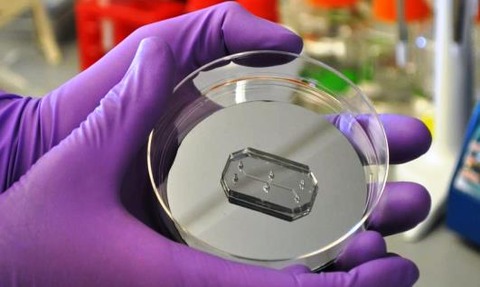Harvard to commercialise 'organs-on-chips' technology
29 Jul 2014

A newly formed private company is to accelerate the development of pharmaceutical, chemical and personalised medicine products.
The Wyss Institute for Biologically Inspired Engineering at Harvard University yesterday announced that its human organs-on-chips technology will be scaled-up for the marketplace through start-up company Emulate.
According to the Wyss Institute, organs-on-chips technology is created using microchip manufacturing methods.
An organ-on-a-chip is a cell culture device, roughly the size of a computer memory stick, which contains hollow channels lined by living cells and tissues that mimic organ-level physiology.
“This is a big win towards achieving our Institute’s mission
Don Ingber
These devices, the Institute suggests, produce levels of tissue and organ functionality not possible with conventional culture systems, while permitting real-time analysis of biochemical, genetic and metabolic activities within individual cells.
“This is a big win towards achieving our Institute’s mission of transforming medicine and the environment by developing breakthrough technologies and facilitating their translation from the bench-top to the marketplace,” said Wyss Institute founding director Don Ingber, who led the ’organ-on-a-chip’ work.
The Institute also claims to have developed an instrument capable of automating the organs-on-chips, and to link them together by flowing medium that “mimics blood to create a ’human-body-on-chips’ and better replicate whole body-level responses”.
This automated platform could translate into more predictive and useful measures of the efficacy and safety of potential new drugs, chemicals and cosmetics, while reducing the need for traditional animal testing, the Institute said.
Harvard researcher Geraldine A. Hamilton told LaboratoryTalk: “The goal with the personalised medicine application is to one day be able to have a ’patient-on-a-chip’. Where we could put the patients’s own cells in the organs-on-chips to test treatments on their own tissue before treating the patient.
“This will allow individualised treatment of disease and healthy ageing, enabling personalised drug therapies.”
According to the researchers, the technology’s rapid development from demonstration to functional prototype is a testament to the Institute’s ability to translate academic innovation into commercially valuable technologies in a big and meaningful way.
“The goal with the personalised medicine application is to one day be able to have a ’patient-on-a-chip’
Harvard researchers Geraldine A. Hamilton
“We took a game-changing advance in microengineering made in our academic lab, and in just a handful of years, turned it into a technology that is now poised to have a major impact on society. The Wyss Institute is the only place this could happen,” Ingber said.
Utilising funding support from the Defense Advanced Research Projects Agency (DARPA), Ingber and his team has developed over ten different organs-on-chips models, including chips that mimic liver, gut, kidney and bone marrow.
Through collaborations with industry, the Wyss Institute team refined their technology, and validated it for market need and impact by testing existing drugs and modelling various human diseases on-chip.
To secure a smooth transition from academia to industry, several members of Ingber’s research team will be taking senior positions at the new company Emulate.

